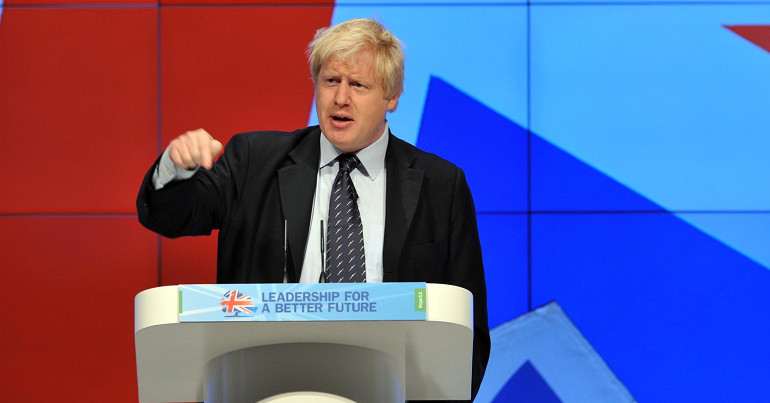Boris Johnson would let the planet burn

It’s hard to work out what Boris Johnson, who took office as Prime Minister of the United Kingdom yesterday, genuinely believes. This is particularly true when it comes to the environment. But a look at his past decisions while Mayor of London between 2008 and 2016 and then as an MP reveal a bit more.
On the road
When he was Mayor of London, very superficially it would appear that he was a “green” mayor. An avid cyclist himself, he encouraged cycling by rolling out his famous “Boris Bike” public bike hire scheme, and in 2016 he lamented that he hadn’t built “more segregated cycling routes for London”. In 2014, as part of an attempt to clean up London’s air, he spent £330 million on 2,400 new hybrid buses, zero-emission taxis and 10,000 trees.
However, in his time as mayor he also shrank the city’s congestion charge zone, acting against efforts to reduce emissions and air pollution in the city, and also held back details from a GLA report which showed that deprived schools in the capital were disproportionately affected by air pollution.
He also delayed the implementation of a new Ultra Low Emissions Zone until after his term as mayor had ended, with his successor Sadiq Khan eventually implementing a much wider reaching version of the ULEZ which included all vehicles within the north and south circular roads.
In the sky
Perhaps his most publicised opinion on the environment while Mayor was his opposition to the expansion of Heathrow, the UK’s busiest airport, with Mr Johnson famously saying that he would “lie down in front of the bulldozers”. While this would appear to be an environmentally conscious position, his continued desire to build a brand new “island airport” in the Thames Estuary hints that he was more concerned with realising this vanity project rather than minimising emissions from air travel.
In parliament
This mixed bag of policy decisions while Mayor of London is best viewed in the context of his later voting record relating to the environment as an MP.
He has consistently voted against measures to prevent climate change. For example, he voted against the energy industry being required to implement a carbon capture and storage strategy, against setting a decarbonisation target for the UK within the first six months of June 2016 and against the implementation of emissions-based vehicle taxes. He also voted for applying the Climate Change Levy to renewable energy sources.
In government
Earlier this year it also came out that while he was Foreign Secretary, Mr Johnson oversaw a 60 per cent cut back of FCO climate attaches working around the world from 165 to just 65. Though these cuts began just prior to him taking office, he did nothing to stop them, with former chief scientist and UK special representative for climate change Professor David King saying that he feared for the UK’s climate plan if Johnson became PM because of these cuts. Professor King told The Guardian that there was a mismatch between Johnson’s commitments in private and his lack of public commitments on the climate crisis.
Dodgy friends
Also significantly, Mr Johnson took a £25,000 donation from prominent climate denier Terence Mordaunt, director of “Global Warming Policy Forum”, the advocacy arm of the climate denying “Global Warming Foundation”. This organisation has been accused of giving a platform to fringe climate science deniers.
Dodgy views
Perhaps most revealing is a 2015 article which Mr Johnson wrote for The Daily Telegraph, just after the signing of The Paris Agreement. Mr Johnson wrote about his own views as a climate science denier and promoted the work of Piers Corbyn (who also happens to be the brother of Jeremy Corbyn, the leader of the UK Labour Party), who believes that temperatures on our planet are rising because of solar activity creating natural climate change cycles, rather than climate change being anthropogenic.
In his article, Johnson wrote:
In the view of Piers and his colleagues at WeatherAction, it is all about sun spots, and he is on record as believing that we are now due for a new ‘Maunder Minimum’ – like the famous cold spell in the 17th century, when the Thames froze several times. Whatever is happening to the weather at the moment, it is nothing to do with the conventional doctrine of climate change.
While Mr Johnson has made some environmentally friendly policy decisions in his past, the vast majority of his actions and comments on the issue are cause for concern amongst environmental groups to say the least. We must now wait and see what he does as Prime Minister, and hope his future actions are better for our planet than his past ones.




We cannot wait, we must force him to take action